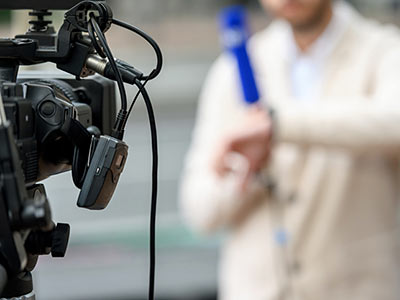Why work with the news media?
Working with reporters can be painless and fun. Proper preparation helps, and the benefits for TMCC are valuable.
- Reach out to a broad community audience through online news sources or traditional sources like newspapers, radio and television, as well as supporting TMCC's goals of academic excellence and a welcoming and supportive atmosphere.
- Make an extra effort to inform people about TMCC's programs and accomplishments. Good news coverage fosters understanding of and support for the college.
- Increasing TMCC's news coverage enhances the public's perception of TMCC's integrity and credibility. Faculty, administrators and staff can announce news through the public information office and respond to reporters' inquiries, which affects the amount of coverage TMCC receives.
When a reporter calls, what should you do?
- Do gather information. The President is the face of the College and often is in the best position to respond to the interview request or suggest someone else. The more information we have, the better.
- Do ask questions. Always ask the reporter's name and publication or broadcast station and request information about the focus of the story. With this information, Marketing and Communications can often pitch additional TMCC story ideas.
- Do contact Marketing and Communications. Marketing and Communications is responsible for TMCC's media relations and coordinates with the President's Office and with reporters and editors. Marketing and Communications will follow up to ensure that the media has all questions answered and that TMCC will receive the maximum coverage possible. Contact us now!
How should you prepare?

- Do go face-to-face. If you are asked for an interview, see whether the reporter will meet in person instead of talking over the phone. While distance and deadlines frequently make this impossible, face-to-face communication is best, especially when explaining complex information.
- Do respect deadlines. Reporters and editors are always on deadline. Please return telephone calls or emails immediately. In most cases reporters need a response in minutes, not hours or days. If you are unable to respond by deadline, please call Marketing and Communications immediately and help us reroute the interview.
- Do prepare a message. Decide on a single message and two or three secondary points that you want to make, and then make them, regardless of the questions asked. (Again, Marketing and Communications offers impromptu support and media interview training.)
- Example: If a reporter calls and asks for general information about the engineering drafting program, start with your main communication objective, "high skill, high wage, hot job market." From that main point, as a faculty member in the engineering drafting program, you can proceed to your secondary points, such as TMCC's business-education partnerships and how a TMCC degree or certificate can open doors to a variety of jobs.
- "There is so much demand in northern Nevada for trained workers, that many employers work with TMCC to hire now and pay later for students to finish their engineering drafting program."
- "In addition, there are a wide variety of jobs available in this area, from draftsman or detailer to blueprint checker or inspector, and in a variety of fields, such as civil, chemical, electrical, geology, mechanical or mining."
- Example: If a reporter calls and asks for general information about the engineering drafting program, start with your main communication objective, "high skill, high wage, hot job market." From that main point, as a faculty member in the engineering drafting program, you can proceed to your secondary points, such as TMCC's business-education partnerships and how a TMCC degree or certificate can open doors to a variety of jobs.
- Do anticipate. Think of any tough questions that you may be asked and rehearse your answers. (Marketing and Communications can help with this, too.) If you are asked questions that you prefer to not answer, address them briefly, and then segue into your main points.
- Do call back. If you are not prepared, tell the reporter you will call back in 15 minutes or so. Collect your thoughts, call Marketing and Communications to go over the information and then follow through on your promise to provide the interview.
- Do lose the jargon. Use simple language instead of technical terms, and please speak in short sentences.
- Do think sound bites. Eight seconds is the average length of a TV sound bite, so be brief. Newspaper reporters can take more time in their interviews and present more information than TV or radio reporters can.
- Do smile (if appropriate). Audiences, especially television viewers, are won as much by attitudes as words, so along with being knowledgeable, be sincere, energetic and even passionate about TMCC.
- Do be honest, above all. In some cases, the truth may hurt, but lies are deadly. If you don't know the answer to a question, say so and offer to find the answer and get back to the reporter as soon as possible.






